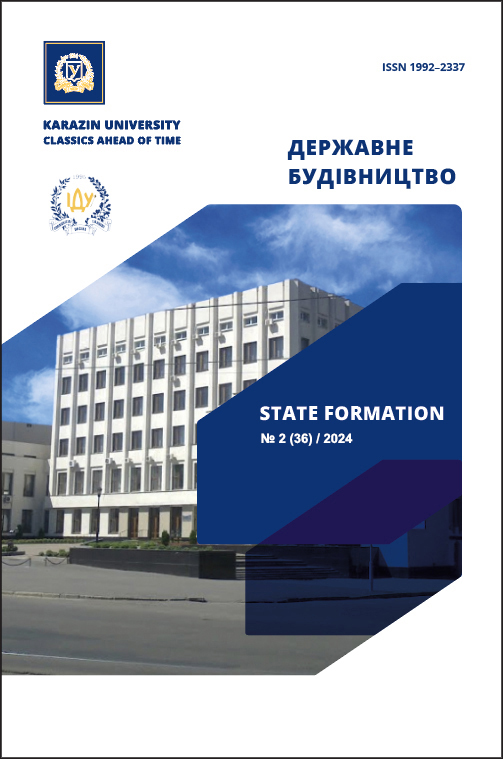Use of blockchain technologies in public emergency management
Abstract
The article thoroughly examines the prospects for the use of blockchain technologies in public administration in emergency situations. A comprehensive analysis of the main advantages of using blockchain to increase the efficiency, transparency and security of management processes in crisis situations is carried out, among which special attention is paid to such characteristics as decentralization, immutability of records, transparency and data security. The author examines in detail examples of successful implementation of blockchain technologies in different countries of the world to solve a wide range of public administration tasks in emergency situations, in particular to establish effective coordination of actions of various entities, ensure transparent distribution of resources and humanitarian aid, reliable verification of information and consolidation of data from various sources.
Based on the analysis of advanced foreign experience, the feasibility and prospects of using smart contracts on the blockchain to automate management decision-making processes and minimize corruption risks when responding to emergencies are substantiated. The potential of smart contracts for optimizing such processes as the distribution of financial assistance, the implementation of compensation payments to victims, monitoring the targeted use of resources and other aspects of crisis management, where the human factor and discretionary powers create the prerequisites for abuse, is revealed.
Based on the identified advantages and successful examples, the article proposes scientifically sound ways and mechanisms for implementing blockchain technologies into the public emergency management system in Ukraine, taking into account its specifics and existing challenges. In particular, the following key areas of implementation are identified: the development of an appropriate regulatory framework, the creation of the necessary technical infrastructure, increasing the level of digital competencies of public servants, and the implementation of pilot projects in various areas of crisis management. At the same time, the importance of ensuring a strategic and comprehensive approach to the implementation of blockchain, which will take into account not only technological, but also institutional, organizational and socio-cultural aspects of the digital transformation of public administration, is emphasized.
The potential areas of application of blockchain in Ukrainian realities are outlined, where distributed ledger technology can bring the greatest added value in the context of improving public administration in crisis conditions. These include the creation of secure databases for information exchange between different entities, increasing accountability and transparency in the processes of distributing financial and humanitarian assistance, automation of insurance payments and compensation for victims, crowdsourcing and validation of data on the scale and consequences of emergencies. The possibilities of using blockchain in combination with other advanced technologies, such as the Internet of Things, artificial intelligence, big data for developing innovative early warning systems, risk forecasting and management of critical infrastructure of the state and territorial communities in crisis conditions are revealed.
Downloads
References
Allessie, D., Sobolewski, M., & Vaccari, L. (2019). Blockchain for digital government: An assessment of pioneering implementations in public services. Luxembourg: Publications Office of the European Union. URL: https://publications.jrc.ec.europa.eu/repository/handle/JRC115049
Berryhill, J., Bourgery, T., & Hanson, A. (2018). Blockchains unchained: Blockchain technology and its use in the public sector. OECD Working Papers on Public Governance, no. 28, OECD Publishing, Paris. DOI: https://doi.org/10.1787/3c32c429-en
Bochkova, E.V. (2020). The use of blockchain technology in public administration. Public Administration: Theory and Practice, 2(69), 23–28. URL: http://nbuv.gov.ua/UJRN/Tpdu_2020_2_5 [in Ukrainian].
Kumar, R. (2018). Securing Land Registry with Blockchain. Legal Era. URL: https://www.legaleraonline.com/articles/securing-land-registry-with-blockchain
Palfreyman, J. (2017). Blockchain for government: Building trust, demolishing bureaucracy. IBM Blockchain. URL: https://www.ibm.com/blogs/blockchain/2017/02/blockchain-government-building-trust-demolishing-bureaucracy/
Santiso, C. (2019). Here’s how blockchain could stop corrupt officials from stealing school lunches. World Economic Forum. URL: https://www.weforum.org/agenda/2019/04/heres-how-blockchain-could-stop-corrupt-officials-from-stealing-school-lunches/
Khan, S. (2020). Blockchain Technology: Opportunities for Emergency Response. Safety Science, 129, 104792. DOI: https://doi.org/10.1016/j.ssci.2020.104792
Nair, M. & Daniel, A. (2020). Application of Blockchain in Disaster Management:
A Review. International Journal of Scientific & Technology Research, 9 (2), 5–10.
Vazirani, A.A., O’Donoghue, O., Brindley, D., & Meinert, E. (2020). Blockchain vehicles for efficient Medical Record management. Digital Medicine, 3(1), 1–5. DOI: https://doi.org/10.1038/s41746-019-0211-0
Drescher D. (2017). Blockchain Basics. Apress, Berkeley, CA. DOI: https://doi.org/10.1007/978-1-4842-2604-9_4
Novikov S.P., Mikheenko O.V., Kulagina N.A., Kazakov O.D. (2018). Digital registry of professional competences of the population drawing on distributed registries and smart contracts technologies. Creative Economy, 12(1), 9–22. DOI: https://doi.org/10.18334/ce.12.1.38783 [in Ukrainian].
Hyvärinen, H., Risius, M., & Friis, G. (2017). A blockchain-based approach towards overcoming financial fraud in public sector services. Business & Information Systems Engineering, 59(6), 441-456. DOI: https://doi.org/10.1007/s12599-017-0502-4
Yoon, H. J. (2019). Blockchain technology and healthcare. Healthcare informatics research, 25(2), 59–60. DOI: https://doi.org/10.4258/hir.2019.25.2.59
Akgiray, V. (2019). The potential for blockchain technology in corporate governance. OECD Corporate Governance Working Papers, no. 21, OECD Publishing, Paris. DOI: https://doi.org/10.1787/ef4eba4c-en
Jun, M. (2018). Blockchain government-a next form of infrastructure for the twenty-first century. Journal of Open Innovation: Technology, Market, and Complexity, 4(1), 7. DOI: https://doi.org/10.1186/s40852-018-0086-3
Kwok, A.O., & Koh, S.G. (2019). Is blockchain technology a watershed for tourism development? Current Issues in Tourism, 22(20), 2447–2452. DOI: https://doi.org/10.1080/13683500.2018.1513460
Krawiec, R.J., Housman, D., White, M., Filipova, M., Quarre, F., Barr, D., ... & Tsai, L. (2016). Blockchain: Opportunities for health care. In Proc. NIST Workshop Blockchain Healthcare (pp. 1-16). URL: https://www.healthit.gov/sites/default/files/12-55-blockchain-opportunities-for-health-care.pdf

